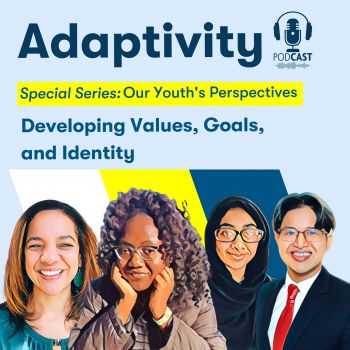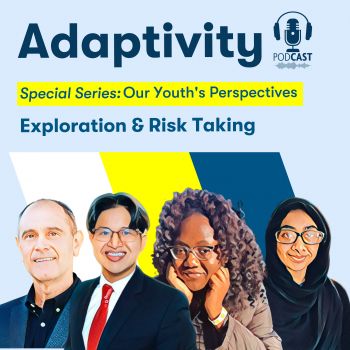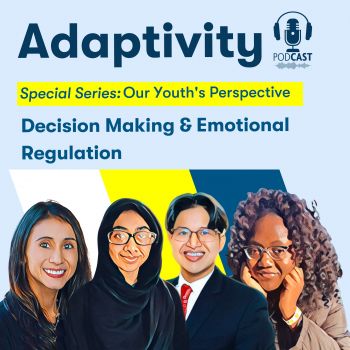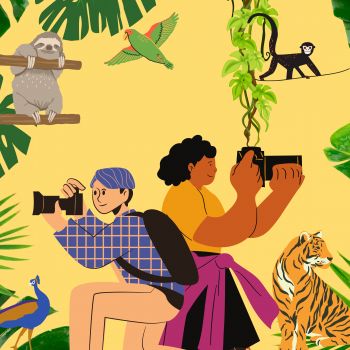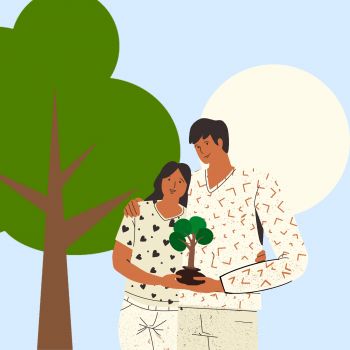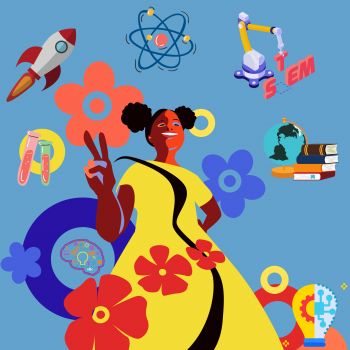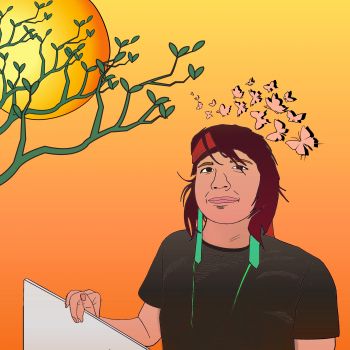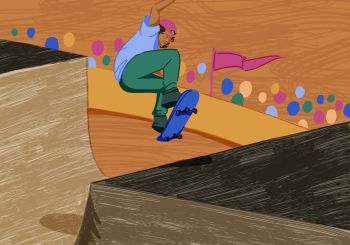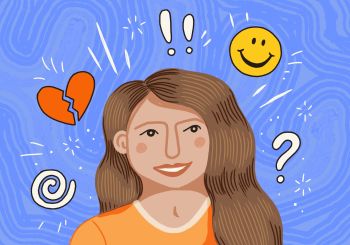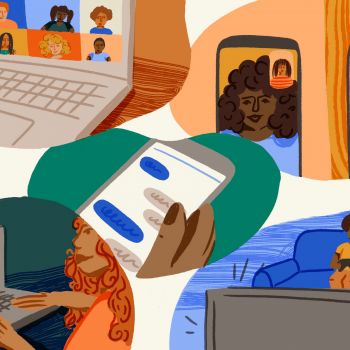Ron Dahl I’m Ron Dahl, founding director of the Center for the Developing Adolescent, and this is Adaptivity, where we explore the science of adolescence, untangling misconceptions about the years between childhood and adulthood. We explore new insights into the rapid, cognitive, emotional and social changes that happen during these years, and how the developing adolescent brain is primed to promote healthy and adaptive learning.
On this special episode of Adaptivity, we’re talking about the importance of relationships during adolescence.
Thao Ha The unique portion I think about adolescent romantic relationships is because they are a foundation, because so much learning is going on, it actually affects the trajectory of your future relationships.
Gustavo Carlo Pro-social behaviors are really where it’s at because that transition to adulthood is going to be very critical for predicting long-term success in terms of developing successful adult relationships.
Yalda Uhls You’re really learning about yourself. You’re learning about the other, you’re learning about another family and another way of living. You’re learning about all sorts of things.
We recorded the following conversation on April 13, 2023, in San Diego at the Society for Research on Adolescence Annual Meeting.
*****
Ron Dahl Thank you very much. I love the theme of thinking about young people in a rapidly changing and adapting to a rapidly changing world. And that is a particularly appealing focus for the frame for what we’re going to be talking about.
We’re going to have a discussion about the research that is driving the really interesting issues about supporting young people, learning about relationships and developing social competence.
And so we’re going to be talking about emotionally charged relationships and a key part of why these are so interesting and hard to study is that these often involve very complex and often very intense feelings and emotions. And this is part of the dynamic nature of these relationships.
At the same time, these overwhelming and confusing and intense and dynamic interaction processes are happening, it’s crucial that we recognize that these are learning experiences, that they’re formative learning experiences, to not only gain knowledge and understanding, but learning how to deal with strong feelings, learning how to deal with uncertainty, learning how to deal with power dynamics. And the only ways these learning experiences can really occur that lead to mastery and competence is experiential learning.
Just watching them, just observing them, just trying to take in the information cognitively is not going to help young people develop these skills and capacities. And in the current era that we’re in, increasingly so much of this learning is occurring in a digital technology context. And that creates unique and unprecedented vulnerabilities and it creates unique and unprecedented opportunities at the same time for connection, for interaction, for learning, as well as information.
We learn as much, if not more, from our errors and mistakes. But in this sphere of relationships making errors when we’re unsure of who we are in relation to other people and we’re insecure and we’re feeling inadequate and having lots of self doubts and experimenting, those mistakes can be really painful and costly and harmful. And and yet if we don’t make mistakes, if we don’t take risks, if we don’t lean into the uncertainty and try things, then we’re not actually going to have the learning that’s necessary.
Now I’m really excited to have an esteemed panel of not only experts with research foundations to these issues, but also individuals who have thought deeply about the kinds of learning experiences and the importance of these learning experiences relevant to adolescent relationships.
Thao Ha is Associate Professor at Arizona State University in the Department of Psychology, who has been having a long, for a long time, been doing really courageous, innovative studies of adolescent relationships in a variety of ways. And we’re really, really looking forward to hearing about some of her insights.
And Gustavo Carlo is Professor in the School of Education and Director of the Cultural Resiliency and Learning Center at UC Irvine and is a leading expert on pro-social development.
And Yalda Uhls, as many of you probably heard this morning, is the founder of the Center for Scholars and Storytellers at UCLA, and has deep understanding of how media and use of media can really shape learning about relationships and innovative work connecting the science to that field.
So now, I’m going to actually ask the panelists to imagine out loud a memory from their own early experiences in their development to really ground this conversation and make it real. And so, Thao, since you actively study these dynamic relationships, would you share some personal experience of yours that provides some insights or is relevant to this.
Thao Ha So I study adolescent romantic relationships. So I guess I will speak to that. So I come from a Vietnamese refugee family. I grew up in the Netherlands and kind of on the edges of society, came from a kind of dangerous, violent neighborhood. And school was not kind of low quality school. And I got bullied because. I was really interested in school and really kind of nerdy.
And so and then I met, I fell in love in, at a very normative developmental time, so I was 15 years old. I haven’t thought about this person for a long time, but I will share. And it was an amazing experience because of all the positive things that come with romantic relationships, but mostly in this context because of his family. And so I remember having dinner–and this is, this is also a Dutch context, not an American context. It’s more normal to actually have dinner with the parents of your partner because you’re getting introduced into the family. But I remember having dinner with them and they would talk during dinner like talk–talk about the media news.
They would ask me questions about how my day was. My parents never asked me that. They would actually ask me about what I learned in school that day and they would have follow up questions. And so dinner at my home was more–was silent because my parents were exhausted and just trying to survive. And I remember that it opened up a whole new kind of world for me because they also appreciated that I was very studious and he appreciated that too, and they really liked that I was into arts and music, and according to my my parents arts and music was something for rich people so we definitely should not spend time on that.
And so for me, this whole socialization context of both my partner and his family was that it actually drew me to college. I think that I had never realized that I could do before and that would perhaps fit me. And so I think this is one of my happy memories about that relationship. It was a two-year relationship. It was fairly committed and yeah, showed a different world to me. And so I think that’s, that would be my memory of him and his family.
Ron Dahl Thanks. Gustavo, you study pro-social relationships and I think you have a story about a social interaction that was formative for you at that time.
Gustavo Carlo Yeah. So it’s maybe not quite as positive as yours, but definitely one of those moments early in my life where I took note of the way some people were being treated differently than others.
I was born in Puerto Rico, so, and then my family moved to Michigan when I was young. And then from Michigan, we moved down to Florida. And so I always think of that as one of those experiences that I went through in terms of my life, where I went from being just one of 3.5 million Puerto Ricans that live on the island. And then moving all of a sudden into a new community. That was where I was all of a sudden being labeled as, you know, Hispanic and being called. All kinds of other interesting names and all that kind of stuff.
But I remember one of these very specific moments where I was just leaving school, high school. After school I was just walking with one of my best friends and we were walking past the playground and we saw this kid being bullied and being harassed by a group of other kids. And the kid was a dark-skinned kid. I didn’t know the bully victim and the other kids–it was a group of white kids, about 4 or 5 of them–And of course, at the time I was really skinny.
And so, you know, it was a little scary to think about possibly intervening or doing something like that. But I told my friend, I said, you know, we should do something about this.and so I actually got the courage with my friend, and you know, just sort of went over in their direction.
And we just basically asked what, you know, what are you doing? Why are you bugging this kid or whatever?
And that didn’t really do anything. But it was, the coolest part about it was that we saw that, in fact, other kids then all of a sudden also kind of joined in. And so, you know, we sort of broke the ice, I guess. But it was to me, one of those, one of those moments that I think about. Now, I guess. a series of episodes and events of that nature that just made me think about why did other kids not, you know, try to do something about it? You know, it wasn’t fair. Um, yeah.
Ron Dahl Thank you. Thank you for sharing that and Yalda, I’m sure you have a story.
Yalda Uhls Oh, yes. So, I grew up in Berkeley. I’m a child of Persian immigrants. And in seventh grade, I had a group of friends who were sort of the medium popular group. And I went to Iran for two months with my family. And when I came back, that group rejected me and the only people who would be my friends were the geeky theater kids, you know, the nerdy kids. And they became my friends in seventh grade.
Eighth grade comes along and I started blossoming. I, you know, I just started looking different. And the popular–the top popular kids in the school decided they liked me and I became friends with them. I became, all of a sudden, everybody wanted to talk to me. I was very popular. But then the two girls at the top of the totem pole, the popular girls, decided I was too popular.
And these two girls turned on me. I would go to parties and people would shove me, you know, I had all these different things happen to me and the only people who would talk to me again were these not-popular kids. So one day I’m sitting with them and my friends who had been my friends really since fourth grade came marching up to me with the popular kids screaming at me.
And the one girl who’s with me, who’s just the geekiest, sweetest girl stands up and starts screaming back at them, standing up for me. And it just was such a story of like you know, first of all, be inclusive, be kind, recognize the users—good lessons for Hollywood, by the way–and even academia–and resilience, you know, because then
I remember talking to another girl who was very popular, who was a nice, popular girl, you know, And all of this is confirmed by research, these kinds of subgroups. And she said, Oh, yeah, they were mean to me, too. And I was like, Oh, it’s not just me. So there were just so many lessons. But it’s an experience that’s seared in my memory.
Ron Dahl Thank you. Captures so many aspects of that, the intensity, how formative these experiences are.
I want to from that foundation of thinking about examples, shift to the research and I’m going to start with you, Thao, as you studied adolescent relationships in depth, what do you think are the reasons that relationship learning experiences are different, unique in some way, perhaps formative in some unique ways from earlier or later?
Thao Ha So romantic relationships during adolescence for a long time were considered just like a shorter version of adult relationships or that’s, you know, those who study adult relationships, that’s how they see adolescent romantic relationships. And then, um, some of the adolescent researchers also saw and peer relationship researchers also were like, well, adolescent romantic relationships are just brief little flings. They don’t have any impact on any social emotional development.
And so we’ve changed. And now it’s considered to be especially by myself, because I’ve been studying it for a long time as a very influential social-emotional learning context. And the unique portion I think about adolescent romantic relationships is because they are a foundation, because so much learning is going on, it actually affects the trajectory of your future relationships. Given the current divorce rate in the United States, which is about 60 percent, we have some pathway and a lot to learn about romantic relationships. So I think as if we think about, like, this as a sensitive phase in which you learn more about your identity, who do you want to be as a partner? What are your preferences for sexuality, intimacy, conflict resolution? How do you deal with the pull between wanting to be with someone and then also your individual self to maintain that? That’s really hard for adolescents.
And the other unique aspect is I think it’s less than–romantic relationships are very much embedded within parental and peer relationships, so much less so later on, but within this time period, it all is intertwined. They are developing autonomy from parents but also still need their help. Parents are still important, Peers are everything. So now we have online peers, peers in person, but what they think of you and your partner and what’s going on is so important. And that’s something we see less so later in life. So it’s very much on a kind of podium, romantic relationship experience. So it’s not as private as it will be later on. And this is not unique to adolescent romantic relationships, but I think it is important to highlight. They’re protective–if these are healthy romantic relationship experiences, they are protective for mental health problems, for substance use problems, especially for marginalized youth, sexual minority youth, gender, minority youth, and also ethnic, racial minority youth. And so I think they have really strong benefits and yeah, therefore really important to study.
Ron Dahl Thank you. One of the framing themes for this conference, but also I think for thinking about relationships and research is a rapidly changing world. And the changes over the last several years, the last decades, not only in terms of the role of digital technology and social media, but also in a time when young people are feeling a lot of uncertainty about who they are and their feelings.
There are in some ways so much more openness to ways of being and non-binary and and who one is attracted to that creates wonderful openness and opportunity ideally, and can also be confusing as young people are struggling as they always have with some of these. What are your thoughts about the rapid changes in the context of how young people are interacting?
Thao Ha So romantic relationships have always been rapidly changing without technology because of all the intense emotions that come with dating, and now it’s amplified. So everything that’s happening online is displayed in front of the whole peer group and those who you don’t know even, and so that is just an accelerator of all the emotional responses that adolescents can have. Um, it is both a risk context, but also a promotive context. And so the risk context is that it really, you know, adolescents are also practicing with emotion regulation. And so all of the the ability to constantly connect with your romantic partner is very triggering because you can see what they’re doing and half of the things that they are doing you may not agree with, and that elicits a lot of emotional, negative emotional affect. And it’s hard to regulate that because then technology also provides a way of dealing with it.
So if you feel like your partner did something wrong, they like someone else’s Instagram picture, for example, then a natural solution is to seek more control over that emotion. And so you use technology to monitor them where they are, what they’re doing, what their friends are doing. Are they in the same place? Are they at a party that you were not invited? Rejection, exclusion, Right. Very strong triggers. And then it’s really easy to start threatening behaviors or controlling behaviors over text. So that’s the risk context. The beautiful context of social media is though, that you can also get a lot of support. So you have your entire network that actually can support you in the moment. You can ask for advice, you can also be validated.
So there was this beautiful qualitative study and black youth were indicating that they were also being reaffirmed in terms of identifying sexual assault cases, for example. And so that’s a really amazing thing that can happen also online. And so I think social media and the digital context is amplifying the bad and the good. And we need to integrate both when we’re thinking about adolescent development.
Ron Dahl Thank you. I’m going to come to some follow up questions later, but I want to shift to Gustavo and I want to ask you about because we’re not just talking about when we talk about relationships, just romantic relationships or just emotionally charged relationships and some narrow sense, but also the formative social interactions relevant to prosocial behavior and pro-social proclivities. What are your thoughts about the unique opportunities and perhaps even vulnerabilities for pro-social learning in adolescence?
Gustavo Carlo Yeah. Um, well, usually I start off by just reminding ourselves that It all starts, of course, from the training grounds that most children or many children have opportunities to get engaged, to engage in these sort of positive social interactions within the context of their home environment. But obviously in adolescence, we’re talking about now transferring those social positive interactions and social skills and competencies into a much broader social context. So, prosocial behaviors are, it’s really where it’s at because, I mean, that transition to adulthood is going to be, I think, very critical for then predicting long-term success in terms of developing successful adult relationships and, you know, in the workplace and, and whatnot.
I think as Thao was mentioning, adolescence is also very important developing purpose, you know, thinking about ways in which you can perhaps contribute and make a difference in our communities or in our schools. And I think we can all think of excellent examples of adolescents that are actually making a difference in our world. And some of it is through their access to media, right? And so, I mean, I think about, like, my generation is like we had such limited opportunities to really create and make that sort of big, broad impact, right, in this sort of positive way. But, you know, the Malala’s of the world, I mean, the kids from Parkland. There are so many examples of these sorts of things occurring And so this generation of adolescents are now exposed to the possibilities, to even greater possibilities. So there are sort of pros and cons to all of this. But nonetheless, I think, you know, as you look around and you see the evidence on in general, the positive sort of consequences, the protective effects of pro-social behaviors and developing these pro-social skills and abilities, I think the positives far outweigh the negatives.
Ron Dahl So I want to follow up on one of the things you were describing, and that is this in many ways a virtuous spiral for young people who are find a way to contribute or to matter by doing things that matter for others or engaged with causes, and that that is positive for their development and feeling good about themselves. But it’s also formative learning about a route to getting those feelings by being generous, kind, helpful, having an impact. And so it creates a sense of agency as well as feeling good.
But what about the equity issues you referred to? How do we create more opportunities for youth more broadly and marginalized youth who may not have many opportunities to contribute?
Gustavo Carlo In some respects, I think that this area is really under researched. What I would say is that there’s a few things that are sort of simultaneously occurring. So where would adolescents who want to create these positive energy sort of behaviors what are the sources of like where they can get inspiration, where they can learn about, you know, these virtues, and these values and things that that hopefully become part of a sense of who they are and who how they view themselves.
But that moral sense, that sort of sense of moral agency, where can they get that? Well, I mean, one obvious source is from their family. And, you know, and I think in our work, we focus a lot on research on Latinx, Latina families. when we examine some of these ethnic, racial, minority families, heritage families, many of these heritages really espouse and endorse strong characteristics that are inherently pro-social. I mean, so in Latinx families, famously there’s this concept of familismo or familism that has to do with one’s affinity to the family and one’s obligation and duty and support for the family.
And already you can tell by the definition of familismo that it’s inherently pro-social. and this is not unique to Latino families. For example, I was at University of Nebraska, Lincoln, and in many rural families in Nebraska, you would see this strong familism sort of component. And what that does is that, again, it provides training grounds for these kids, early training grounds for these kids to learn to not just be thinking about themselves, but to think of others right in the context first of the family.
But again, then when you transfer that to adolescents, all of a sudden you have, you know, a generation or a cultural community that is oriented towards others and not just themselves, right? Um, and there are values, traditional values, like respect, you know, respeto, and I remember this distinctly from my mother blazing this in my brain that I needed to grow up to be bien educado, meaning that I needed to grow up, to be considerate of others, to be well mannered, to have good moral character. The message I got was that that was just as or perhaps even more important than being getting a formal education. Right? So you have all these sorts of things that I think inherently sort of move many adolescents and many kids to being thoughtful about others and not just about themselves.
Ron Dahl So Yalda and in your work with the Center for Scholars and Storytellers and your broader research interests, what are your thoughts about how media broadly considered can be a positive force in how young people are learning about relationships and how they’re learning about opportunities for larger contribution and pro-social development?
Yalda Uhls I think it can be incredibly positive source and can be the first kind of place they get exposed to these larger-than-life missions. You mentioned Malala. You know, there’s a documentary, you see her, you see the Parkland kids on social media. In some ways, too, just seeing near-peers, you know, do these kinds of things, that’s more motivating than seeing, you know, somebody get into the Olympics or, you know, whatever these sort of larger or a celebrity succeeding at a very high level
During adolescence – and this is why I think relationships are so different and unique – you’re really learning about yourself. You’re learning about the other, you’re learning about another family and another way of living. You’re learning about all sorts of things, and your body is changing, your brain is changing. And there may be some, you know, anxiety or things that you’re feeling that you don’t know where to go to. And media can be a source of information. You see a character that’s going through something and you relate to it. And so from our research, we saw that these kids, these 13- to 17-year-olds, were looking for information online because of what they saw.
Why can’t we also then connect the narrative to what’s off screen and sort of create sort of we call it there’s trans media–People call it trans media or second screen content or bonus content–content that helps the young person get access to good information or have a conversation with someone about the content. So we kind of feel like if you can connect the narrative and the media with content that’s off screen or on another screen, you can really get the best processing of the information that they see. So like, for example, if you saw, if it was prosocial behavior, you see something that a kid on the show is doing something around civic engagement. And then there’d be a video that, or a QR code and you’d see this video and it’d say, I want to start your own program at your school or your community, things like that, we get very excited about and we’re trying to convince industry to do it. It’s a long, hard road, but we’re at the point where I feel like media can be just such a great way to get to young people. And if we can get the content and the creators to really focus on the positive impact, we can really have a lot of positive impact.
Ron Dahl So coming back to an earlier theme about these natural motivations for many adolescents to climb the social hierarchy, to want to move up in terms of social status, that’s been well understood for a long time. There’s a second body of research that suggests that what is often in parallel or an alternative path to similar motivations is earned prestige and social dominance versus earned prestige. And that if at some level, the desire is to feel valued and appreciated and have autonomy, earned prestige is a more prosocial way, but then it comes back to what are the criteria for earning prestige? How is that conveyed by family, by culture? But increasingly that’s conveyed. For many young people, by media.
And so I wonder and I’ll start with Yalda, because the media may be shaping this in ways that we don’t even give much thought to in terms of what feels like authentic ways to earn prestige or respect may be very narrow, or it could be a diverse, wonderful range of ways to to contribute.
So thoughts about how media may be playing some role in conveying implicit learning about these things.
Yalda Uhls There’s so many conversations about the social quantification that you get on with likes and comments and particular in that pre-teen phase when they’re getting on to the media and they’re already concerned with popularity and social dominance and sort of figuring it all out. And that’s when it’s really important to help reinforce value systems and really help them process that this social quantification of popularity through this device is not real, But as they develop and as they get to be older adolescents, many, many, many young people figure this out.
But then you see things on TikTok or different things where people are having a career out of actually following their interests or doing pro-social things. There’s one guy who gives money away to people. He gives $500 after they, you know, did something nice. I mean, there’s so many things that are motivating and that are positive. And just like anything else, it’s reflecting both the positive and the negative. But I think really, it’s a system, right? So it’s not just the media, it’s also what’s around the media. It’s also caring adults and people around helping the adolescent process it and come to understand what makes them feel good, what is reflecting the values of the family. So, you know, we work with the content creators to try to make sure that the images and the shows and the entertainment media that young people are seeing are going to have the most positive impact. But there are so many other variables around it that also need to support young people so that they’re taking away from the media and these opportunities, the message we’d like them to take away.
Ron Dahl So what I want to ask each of you is and I’ll start with with you, Thao, that if you could focus a light on one thing, either as a research question or as an applied way to take what we understand to have a positive impact on how adults or policies or practices could support healthy relationship learning. What would you shine a light on, either something we need to know, or something we know and we need to apply?
Thao Ha If I were to have unlimited money and time, I think it would be great if we could support adolescents in their romantic relationships much more in both in their social environment and cultural norms. Also in Arizona, it’s, you know, there’s no sex education. And so a lot of the media content that they go to is actually not as positive because it’s not as developed yet, right? I would suggest a multi-level approach which is so academically boring. But I think it is about starting conversations about healthy relationships much earlier before they are dating and then not just parents, but also within schools, within social media. And all the way up to the larger social media context.
For example, TikTok is terrible when it comes to relationship advice, yet it is so popular, right? For adults and adolescents, it’s terrible. So working on that content, but also use the knowledge that we have that we have from developmental science for interventions that are more technology based, which is we, you know, the funding is often not big enough to actually come up with cool apps or just-in-time interventions that are speaking to adolescents because they don’t look as great as what they see on their phones.
And so and I think especially when it comes to like, you know, adolescence as a sensitive phase for development, but also when I think about adolescent romantic relationships, there is a lot of times in which they are eager to learn. They are really, really eager. So breaking up is horrible. They often seek guidance from peers or parents, but they can’t find it.
How to learn to be intimate with your partner is another area. Like how do you do that? That’s so awkward, right? Especially if you’re mostly on your phone and then there’s an in-person thing going on.
So I think we can do so much more at different levels in different contexts at the right time. And promoting sexual education is often about risk and prevention, but there is almost no emotion involved, for example. And it’s all about emotions at this age, especially about these topics. And so I think we can make everything that we do more relevant in their language.
So, you know, another example is we use the term “intimate partner violence.” They don’t really relate to that. They relate to the term “toxic relationships.” They get that. And so it’s just a very simple terminology thing. But I do think we have much more reach if we start using that language, if we are there at the right time with the right kind of message that they want to hear.
Two days ago I had car issues and I had the most amazing Lyft driver and she heard what I did and she was like, Oh my gosh, can you please develop content just like, about healthy romantic relationships? Why are we spending this much money on substance abuse prevention when it’s all about relationships? So I feel encouraged by her. And she said, and this was so interesting to me, “The only reason why I know about what’s going on is because I’m online dating. And even though I have my emotion regulation”–she was very advanced in her knowledge about all this–“But even though I know that a lot of it is fake and a lot of it is triggering and I shouldn’t take seriously, I get into it too.” And so I think we have an opportunity and. And also, you know, this is what we should be working on, I think, is to provide more support.
Ron Dahl Thank you. That was really wonderful. And Yalda, Why don’t you, since you want to go next–
Yalda Uhls Yeah, it’s interesting. So I would love to increase and build our youth media representation group, which is a group Virtual Young People, 13 to 18 from around the country. And they, we do youth participatory action research with them. We ask them a question about media and mental health usually, and or we just say that’s the topic.
They come up with the research question. We have them go back to their communities.
And in fact, one of the research questions they looked at last year was around where and it was a group of queer youth that really felt like there was no sex education on in content for queer youth, but that there was tons for heterosexual youth. And so they asked their community and what they found and they were surprised was heterosexual youth also felt there was no good content. And they talked about like, Heartstopper and Sex Education, these few shows that are out there.
But definitely everybody’s starving. And they do look to media and they’re very, very few examples. And so what we’re trying to do is train them to speak for more than just themselves. To speak for their community around something that they care about that has to do with media, and then training them to speak to storytellers, to understand the issues storytellers have to deal with, and then figure out how to share that information. So we put these teens in front of 150 people, and they talked about the research that they did in their community.
And we found huge success. I mean, this room that we put them in front of, everybody walked out and said, “Why aren’t we consulting with teens more?” And we’ve had a couple of screenwriters ask us to have these teens read their scripts and give notes. So I feel like that’s the place I would like to focus is, you know, getting the youth voice out there, You know, giving them some training around it about how to be productive.
Ron Dahl Thank you. Gustavo, you get the last chance to do your research-to-policy magic wand.
Gustavo Carlo I guess I’ll start out with something that probably isn’t possible, but what the heck! You know, I think about these amazing kids that went out there and protest the gun violence and the, in Tennessee and all over our country and around the world, you know, there’s all these fantastic movements of kids and teenagers going out there.
So I don’t know, maybe something is going right because that gives me a lot of hope.
But I also, I’m really quite aware of the fact that our systems are inherently racist and divisive. And we have–obviously our politics is incredibly divisive and has created divisiveness in our society and our communities, within our schools, our neighborhoods. So I guess if there was one thing that I would like to focus on, it would be our educational system and, you know, our educational system, fantastic system in many respects, but it is still very much individualist-oriented.
If we could restructure our systems in ways that maybe creates more of a collective sort of sense of who we are as people, as who we are as communities, really, maybe in incorporating more aspects of education that would really foster cooperation and collaboration and desegregation and, you know, those kinds of things.
Because I do feel that in many respects, a lot of our country and our communities are segregated. And I think a lot of misunderstandings and a lot of conflict can arise from that. And we have an awesome opportunity to create systems that would be much more equitable and perhaps offer opportunities for our young generation to mix and interact with each other and really come to understand each other and understand how much more in common we have with each other than the differences. I know that sounds kind of corny and everything, but I guess that’s, that’s where I would love to put my efforts in,
Ron Dahl I just wanted to add that I think there is enormous opportunity and I think it’s a really important framework to not just be thinking about the US or not just thinking about, you know, wealthy countries around the world. Of the 1.2 to 1.4 billion young people who will be coming of age in the next ten years, about 90 percent of them are in low-and middle-income countries. And how they do that, the degree to which they thrive and the degree to which they contribute and become leaders and contributors is going to have a huge impact on our planet.
Technology is rapidly changing young people’s experiences everywhere and there is increasingly more and more access and shared access in ways to connect. So there are unique challenges and differences in language and culture, and I think there’s unique opportunities for sharing ways to have positive learning experiences and support young people in these really formative times. And we need more research and we need to have that bigger perspective.
So I want to thank the panel so much. This is a great discussion. It was a fun experiment to do a live podcast and thank you to the audience. It’s been a really wonderful experience and hopefully we can continue these discussions and this important, these important areas of work. Thank you so much.
*****
Ron Dahl Our conversation was recorded on April 13th, 2023, in San Diego at the Society for Research on Adolescence Annual Meeting
My guests at this panel discussion highlighted so many important points about emotionally charged relationships and how they can contribute to formative learning during adolescence, to the development of prosocial behavior and social competence to learning about who we are and to the new intense feelings of caring deeply, not only about someone we love, but also about learning to care about what really matters. And perhaps, if we’re fortunate, learning how deeply rewarding it can be to contribute to something larger than ourselves.
These discussions raise compelling questions about the need for research to better understand the dynamic and formative learning experiences. And how to leverage this understanding to better support young people to make it more likely for them to develop in positive ways for their own health and well-being, as well as for their capacities for positive impact to the growing challenges of our rapidly changing world.
*****
Thanks again to our panelists, Thao Ha, Gustavo Carlo, and Yalda Uhls for joining us in San Diego and to everyone else who helped make this conversation possible. Xavier Vazquez engineered this panel discussion. Greg Schumsky directed audio/visual for this conference. Elise Brumbach, the policy coordinator at CDA, assisted us, and Kim Sheridan at SRA invited us to be here.
And special thanks to our wonderful audience.
If you’d like to learn more about the science of adolescence, visit us at Adaptivitypodcast.org, or share your thoughts through the contact information at our website. or by using the hashtag #AdaptivityPod. Our podcast is produced at UC Berkeley for the UCLA Center for the Developing Adolescent. Our senior producer is Polly Stryker. Our producer is Meghan Lynch Forder. Our engineer is Rob Speight. I’m Ron Dahl. Thank you for listening.

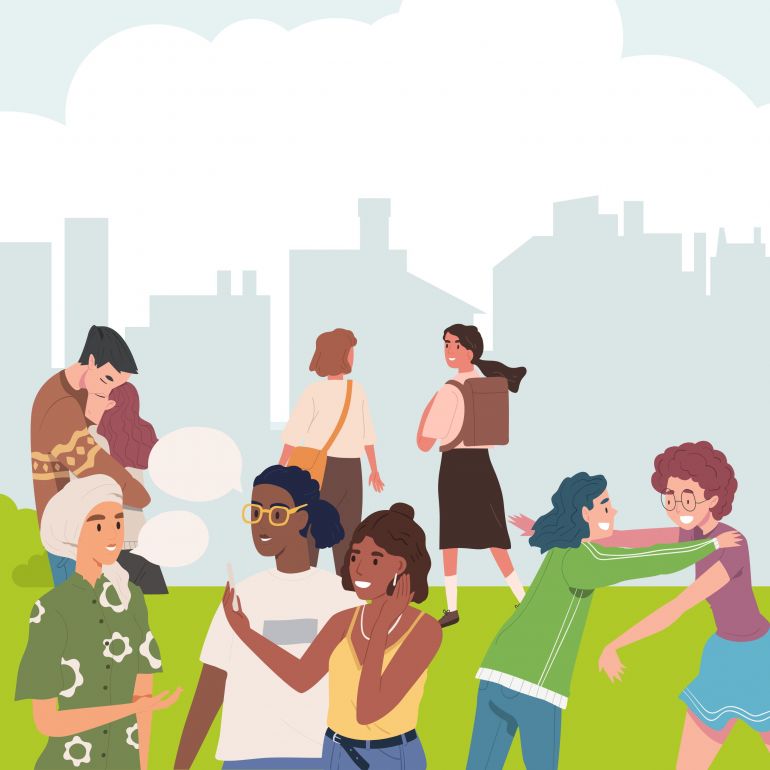
_350_350_80_c1.jpg)
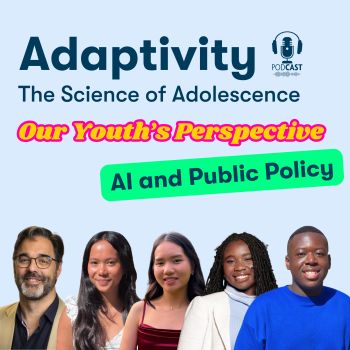
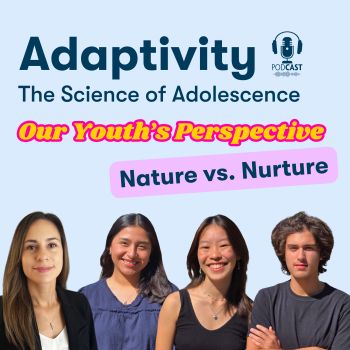
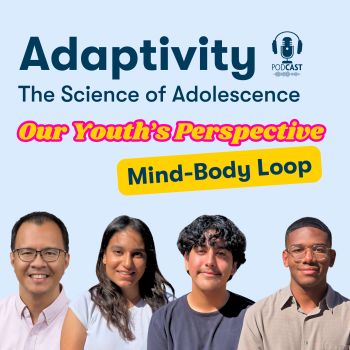
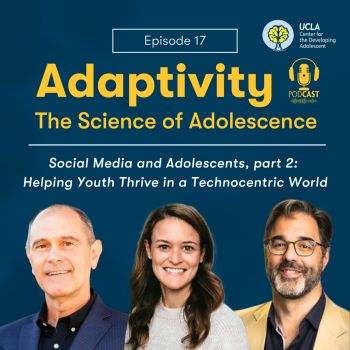
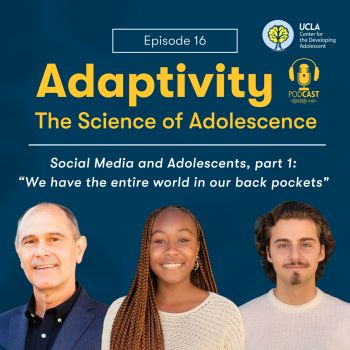
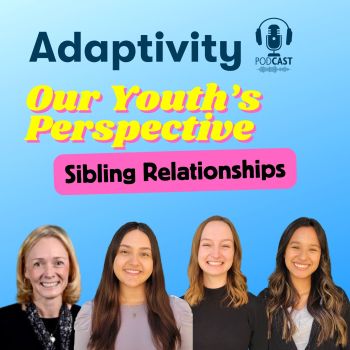
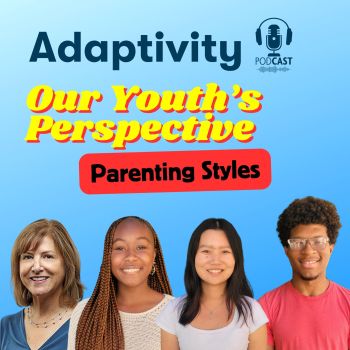
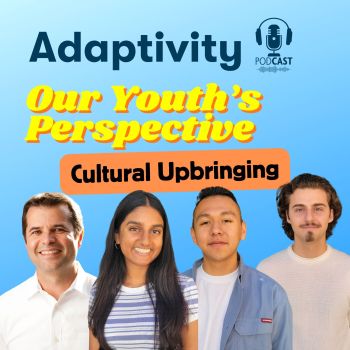
_350_350_80_c1.jpg)
